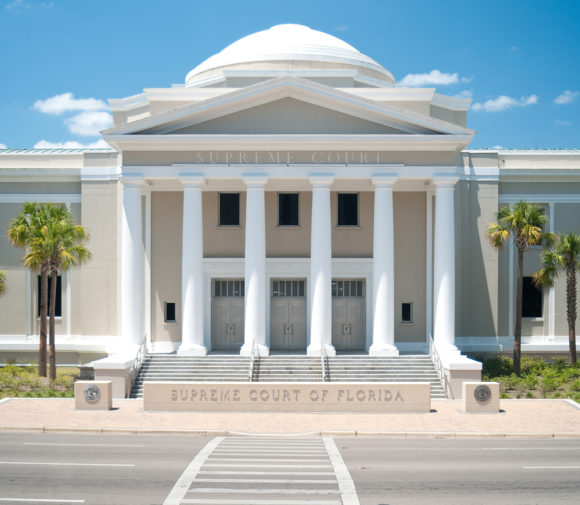Claim Was Settled, But Insurer Attorneys Revealed Mediation Info, Claimants’ Lawyer Says
An appeals court cannot be used to prohibit a lower court’s decisions, except through the normal appeal process, the Florida Supreme Court decided Thursday in a case that involves some of the best-known insurance law firms and more than $800,000 in plaintiff’s attorney fees.
The Mintz Truppman vs. Cozen O’Connor and Lexington Insurance Co. case began as a claim dispute in Miami but turned into a suit over the confidentiality of mediation proceedings. The matter has wound its way through federal and state courts for eight years, despite a settlement on the original claim that was reached in 2016.
And it’s far from being resolved: The high court on Thursday remanded the case to Florida’s 3rd District Court of Appeals, with instructions to send it back down to the circuit court in Miami-Dade County.
The insurance attorneys could not be reached for comment. But in court filings they have said the latest legal wrangling is mostly about the plaintiff’s lawyer looking for a way to boost his fees. Timothy Crutchfield, with the Mintz Truppman plaintiffs’ firm, said he’s not asking for more money, but that his secondary suit is crucial to help prevent parties from revealing sensitive information that’s discussed in confidential mediation proceedings.

“It’s extremely important that lawyers do not ignore the confidentiality of mediation,” Crutchfield said. Otherwise, attorney fee information can be taken out of context, publicized and distorted, he said.
And with more Florida property insurers moving to resolve claims disputes through mediation and arbitration, the issue could take on new gravity in coming years.
“This has never been addressed by the appellate courts on this issue,” Crutchfield said.
The case began in 2014, when a broken pipe caused substantial water damage to the home of Daphne Query in Miami. She hired Mintz Truppman and filed suit against her insurer, Lexington Insurance Co.
Lexington retained Cozen O’Connor, one of the larger insurance defense firms in Florida, and Cole, Scott & Kissane, another well-known defense firm. The case was removed to federal court in south Florida.
In 2016, after mediation, the parties reached a settlement agreement on the amount of the damage – $125,000, court records show. But they couldn’t agree on the amount of the plaintiff’s attorney fees. Mintz’ lawyers argued that $828,000 was the proper amount, considering the lodestar factor and a fee multiplier of 2.0, reflecting the reported difficulty of the case and other factors.
Cozen balked, saying the fees should be more like $75,000. Eventually, it was left to a federal judge to decide, who landed on $240,000. The magistrate did not include the multiplier. Query’s lawyers did not object and did not appeal the decision. In 2017, Lexington paid the attorney fees and the $125,000 claim.
That was the end of the claim dispute but not the end of the litigation.
Before the settlement payment was finalized, Crutchfield objected to what he called a mediation confidentiality breach. He filed suit in Miami-Dade Circuit Court, charging that Lexington and Cozen had violated a 2004 Florida statute by revealing to the federal court the homeowner’s initial claim amount, something that was discussed only in mediation proceedings.

Lexington attorneys said they had filed the initial claim amount as a way to show that the insured had, in fact, asked for a different amount early on. They also argued that the revelation was kosher since it was part of the larger litigation proceedings. And anyway, the federal court had approved the settlement and the fees, effectively barring the state court from interfering in the matter.
Cozen’s lawyers asked the Miami-Dade Circuit Court to dismiss Crutchfield’s lawsuit. The judge declined. Cozen then asked the 3rd District Court of Appeals to step in and issue an exceedingly rare writ of prohibition, blocking the Miami judge from siding with Crutchfield on the motion to dismiss his mediation-confidentiality suit.
The 3rd DCA agreed with the Cozen attorneys and prohibited the lower court’s ruling, noting the trial court lacked jurisdiction.
Crutchfield said that the DCA judges had misconstrued the nature of his suit. He appealed to the state’s highest court.
The Florida Supreme Court ruled Thursday that the DCA had misconstrued the nature of a writ of prohibition. The instrument may only be utilized to prevent a lower court’s action, not to correct it.
“Were we to permit litigants to seek prohibition in every case in which a trial judge denies a motion to dismiss based on collateral estoppel, res judicata, or any other affirmative defense, the writ could be used to end-run our rules on appeals generally and interlocutory appeals in particular,” Justice John Couriel wrote for the court. No justice dissented in the opinion.
The court quashed the DCA decision and remanded the case to the Third District with instructions to deny Lexington’s and Cozen’s claims for a writ of prohibition and to adjudicate the arguments for certiorari that it had previously declared moot.
“This is good. It shows that a writ of prohibition should have a very limited use,” Crutchfield said.
On the underlying mediation confidentiality suit, it could be another year or two before it is finally resolved.
“It needs to go back to the trial court and be fully litigated,” he said. “There are still a lot of questions that need to be answered.”
Cozen lawyers and Cole, Scott, Kissane attorneys could not be reached for comment on the decision.
Topics Legislation Florida
Was this article valuable?
Here are more articles you may enjoy.



 Judge Awards Applied Systems Preliminary Injunction Against Comulate
Judge Awards Applied Systems Preliminary Injunction Against Comulate  Portugal Deadly Floods Force Evacuations, Collapse Main Highway
Portugal Deadly Floods Force Evacuations, Collapse Main Highway  Fingerprints, Background Checks for Florida Insurance Execs, Directors, Stockholders?
Fingerprints, Background Checks for Florida Insurance Execs, Directors, Stockholders?  Trump’s Repeal of Climate Rule Opens a ‘New Front’ for Litigation
Trump’s Repeal of Climate Rule Opens a ‘New Front’ for Litigation 


